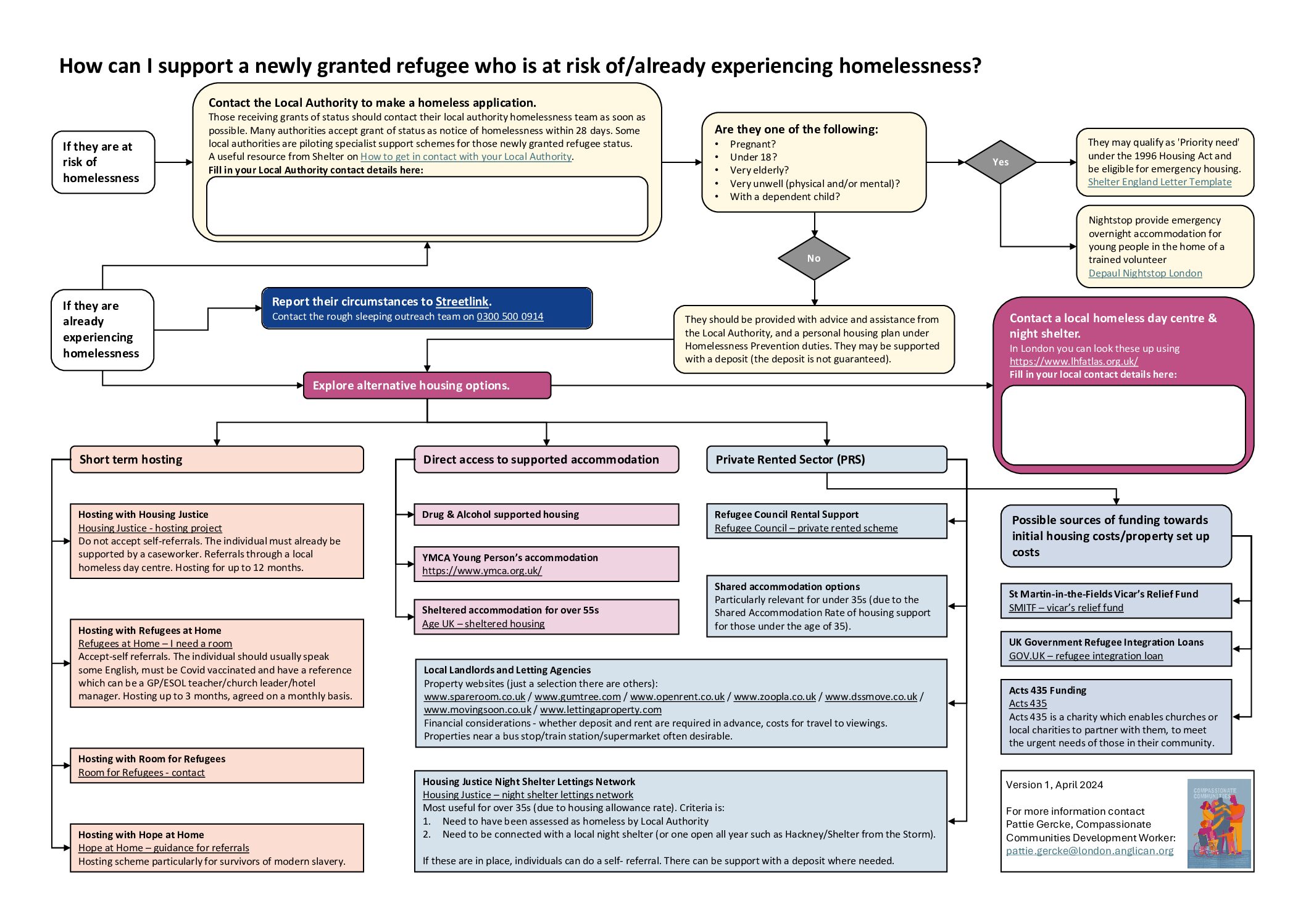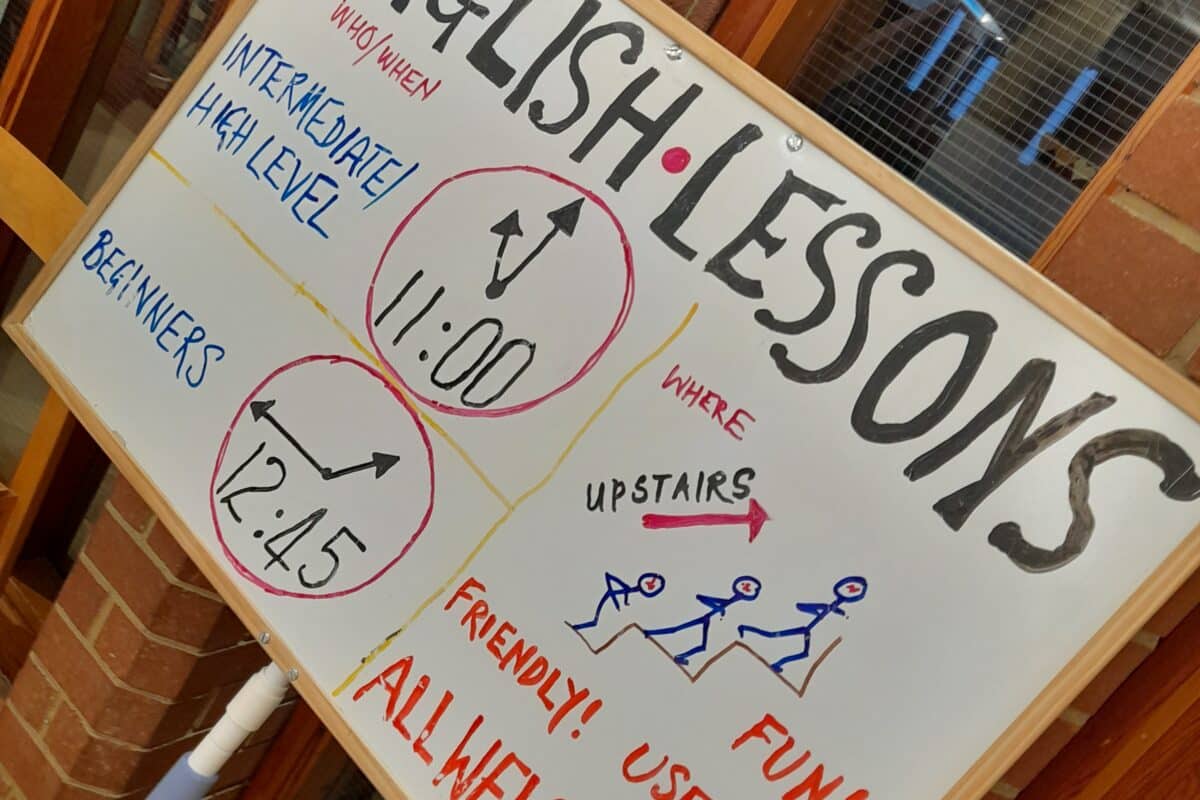Our church communities, like many other faith groups, community organisations and charities, are involved in supporting people staying in Home Office accommodation, waiting to hear about their asylum claims. Churches often provide practical, emotional, or spiritual support during this time.
The receipt of a positive decision by the Home Office on a person’s asylum claim should be a moment of joy, and the start of a new life in the UK. However many of our churches support newly recognised refugees who find it difficult to set up bank account, receive universal credit, or find employment, and housing in the 28 day timeframe provided. For some refugees this results in the risk, or reality of homelessness.
We have compiled below resources around some of the common areas where our churches are supporting newly recognised refugees.
Finding an affordable home is difficult, and particularly so in the content of our national housing crisis.
We have compiled a flow chart which provides information about the various pathways to housing for a newly recognised refugee (scroll down to view).
There is always a desperate need for more housing and there are a number of important ways church communities can help:
- Hosting– If you have a spare room, you can offer it to a refugee in need through a recognised hosting scheme. Two excellent hosting projects are run by Refugees at Home and Housing Justice Hosting Project. Or contact us to be connected to a hosting project.
- Lodging– Housing Justice have a new lodging scheme where you can become a resident landlord and host a refugee for up to 6 months whilst earning extra income.
- Renting out a property– If you, or anyone you know, has a property you may be willing to rent to a refugee at Local Housing Allowance rate (less than market rate), please get in touch with us to explore this opportunity.
There are a number of organisations in London who can support refugees into employment. We have enclosed just a few of the schemes available below:
The Refugee Employability Programme (REP)– The Refugee Employability Programme (REP) offers refugees case work support to find a job, as well as help to learn English, and wider integration support. A refugee can self refer, or a church can refer them into the scheme. Some of our churches are hosting a case worker weekly, where there is enough demand for this service.
When booking an appointment they will require a name, contact number and whether an interpreter is required. Transport costs are usually reimbursed with prior agreement of the REP Case Worker.
People under the following schemes are eligible for the REP:
- Resettlement Scheme (UKRS)
- Afghan Citizens Resettlement Scheme (ACRS)
- Afghan Relocations and Assistance Policy (ARAP)
- Community Sponsorship Scheme
- Refugee Permission to Stay
- Mandate Resettlement Scheme
- Refugee Family Reunion
For more information, click HERE to watch back the information session on the REP hosted by the Compassionate Communities team. Or further information can be found HERE.
The Refugee Council Employment Advice and Support Service– They provide information, advice and guidance to support refugees living in London in accessing appropriate training and employment opportunities.
The Jobs Centre– They can support newly recognised refugees to find employment. It can be useful to ask if they have a lead on refugee support within your local job centre team.
Citizens Advice- provide a wealth of advice around Universal Credit on their website. Citizens Advice also provide Help to Claim Advisers who support with the early stages of a Universal Credit claim.
Universal Credit Trainings– You can read and watch our Compassionate Communities training material on Universal Credit, equipping clergy and volunteers in churches to support those who are navigating the system.
In this training we cover:
The Refugee Council have created a guide to banking for refugees, available in several different languages.
Shelter also provide helpful guidance on opening a bank account for those with no fixed address.
Finding money for a deposit or rent in advance for accommodation can be difficult for a newly recognised refugee. A couple of sources of funding we are aware of are:
- Refugee Integration Loans– Refugees can apply to the government for an interest free integration loan. These can take some time from application to receipt of the loan.
- Acts 435– Churches can also partner with the charity Acts 435. They can then post small requests for financial needs for refugees and asylum seekers on the Acts 35 website where donors can see and meet those needs. You can find out more in the information session with Acts 435 hosted by The Compassionate Communities Team.
- SMITF Vicar Relief Fund– Provide crisis grants to individuals at risk of, or currently experiencing, homelessness. Their grants must be applied for via frontline workers.
It is important that any problems with a person’s BRP are reported within 10 days of arrival through the government website.
If they have not received their Biometric Residence Permit (BRP) then there are details on the government website here of what to do.
There are a number of different documents a newly recognised refugee receives from the decision on their refugee status.
- Document one: The asylum determination letter- this is the letter with notice of the decision on an individual’s refugee status.
- Document two: The Biometric Residence Permit (BRP)- this can be used to confirm a person’s identity, right to study, or right to any public services or benefits they are entitled to.
- Document three: The discontinuation letter- this is a letter issued by the Home Office stating that the asylum support will be stopped from a specific date. This will be the same date as the notice to quit (NTQ).
- Document four: The notice to quit (NTQ)- The notice to quit is essentially the eviction letter. This is received from the accommodation provider. The Home Office notifies the accommodation provider that support is to be stopped on a specific date and asks them to issue the notice to quit.
Flowchart
We have sought to summarise the various pathways to housing for a newly recognised refugee in a handy flowchart, which can be downloaded and printed for use in churches and other settings. There is space to include specific information based on your location. The flowchart can be viewed below – scroll down for the downloadable versions.
We have also translated this flowchart into Farsi as we know there are a particular number of churches working with Farsi speaking refugees.

Downloadable Flowcharts
If you identify any errors or incorrect links in these flowcharts, please do contact us and let us know so we can update them.
